Mark David Gerson's Blog, page 17
October 18, 2011
Writing Do's and Don't's
Do's...
 1. Remember: There are no rules. None.
There is no right way (including this one). There is no wrong way. There is only your way...the way that works for you, today.
1. Remember: There are no rules. None.
There is no right way (including this one). There is no wrong way. There is only your way...the way that works for you, today.
2. Get out of your own way. Ask any part of you that is logical, analytical, critical, cynical, doubt-filled or judgmental to step aside for the duration of your projected writing time.
3. Leap into the void...and trust. Don't worry about being polite, appropriate or correct. Don't worry about making sense. Don't worry about the next word, paragraph, chapter or scene. Don't worry about the ending. Don't worry about the beginning. Don't worry about anything. Just blurt it out...moment by moment, breath by breath, word by word.
3a. Listen...and always go with your first thoughts. Second thoughts and second-guessing come from that part of your mind that is judgmental or censoring. Trust that what's coming to you is what calls out to be expressed in this moment. Allow it to be expressed. Trust it and surrender to it. Fully and unconditionally.
4. Write. What else is there to say?
Don't's
1. Don't force your words into a straitjacket. Instead, let your words and their innate wisdom determine the form of your work. In other words, if your novel wants to be a screenplay, let it. If your short story wants to be a poem, let. If your poem wants to be a song lyric, let it. It doesn't matter whether you've ever written a novel, screenplay, short story, poem or song. Your story, whatever it is, knows best. Always.
2. Don't reread your work if you're feeling critical or judgmental. Instead, wait an hour, a day, a week or a month...however long it takes for you to be able to see your work from a place of heartful discernment, not harsh judgment.
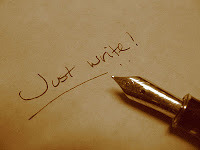 3. Don't worry about the next word, the next sentence or the next chapter.
Instead, remember that the next word will come as easily as your next breath...if you let it.
3. Don't worry about the next word, the next sentence or the next chapter.
Instead, remember that the next word will come as easily as your next breath...if you let it.
3a. Don't forget to breathe. Instead, consider that if you're feeling stuck in your writing, you're probably also stuck in your breathing (and vice versa). Take a moment to center yourself and refocus on your breath.
4. Don't let fear, distraction, low self-esteem, doubt, anxiety, judgment, perceived lack of time, so-called writer's block or other people's criticisms or expectations stop you. You're a writer. Just write.
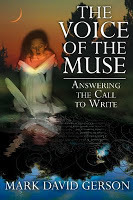 Adapted from"13 Rules for Writing" from The Voice of the Muse: Answering the Call to Write (c) 2008 Mark David Gerson
Adapted from"13 Rules for Writing" from The Voice of the Muse: Answering the Call to Write (c) 2008 Mark David Gerson
Please "like" these Facebook pages:• The Voice of the Muse book • The MoonQuest movie • The MoonQuest book • Mark David Gerson

 1. Remember: There are no rules. None.
There is no right way (including this one). There is no wrong way. There is only your way...the way that works for you, today.
1. Remember: There are no rules. None.
There is no right way (including this one). There is no wrong way. There is only your way...the way that works for you, today.2. Get out of your own way. Ask any part of you that is logical, analytical, critical, cynical, doubt-filled or judgmental to step aside for the duration of your projected writing time.
3. Leap into the void...and trust. Don't worry about being polite, appropriate or correct. Don't worry about making sense. Don't worry about the next word, paragraph, chapter or scene. Don't worry about the ending. Don't worry about the beginning. Don't worry about anything. Just blurt it out...moment by moment, breath by breath, word by word.
3a. Listen...and always go with your first thoughts. Second thoughts and second-guessing come from that part of your mind that is judgmental or censoring. Trust that what's coming to you is what calls out to be expressed in this moment. Allow it to be expressed. Trust it and surrender to it. Fully and unconditionally.
4. Write. What else is there to say?
Don't's
1. Don't force your words into a straitjacket. Instead, let your words and their innate wisdom determine the form of your work. In other words, if your novel wants to be a screenplay, let it. If your short story wants to be a poem, let. If your poem wants to be a song lyric, let it. It doesn't matter whether you've ever written a novel, screenplay, short story, poem or song. Your story, whatever it is, knows best. Always.
2. Don't reread your work if you're feeling critical or judgmental. Instead, wait an hour, a day, a week or a month...however long it takes for you to be able to see your work from a place of heartful discernment, not harsh judgment.
 3. Don't worry about the next word, the next sentence or the next chapter.
Instead, remember that the next word will come as easily as your next breath...if you let it.
3. Don't worry about the next word, the next sentence or the next chapter.
Instead, remember that the next word will come as easily as your next breath...if you let it.3a. Don't forget to breathe. Instead, consider that if you're feeling stuck in your writing, you're probably also stuck in your breathing (and vice versa). Take a moment to center yourself and refocus on your breath.
4. Don't let fear, distraction, low self-esteem, doubt, anxiety, judgment, perceived lack of time, so-called writer's block or other people's criticisms or expectations stop you. You're a writer. Just write.
 Adapted from"13 Rules for Writing" from The Voice of the Muse: Answering the Call to Write (c) 2008 Mark David Gerson
Adapted from"13 Rules for Writing" from The Voice of the Muse: Answering the Call to Write (c) 2008 Mark David Gerson
Please "like" these Facebook pages:• The Voice of the Muse book • The MoonQuest movie • The MoonQuest book • Mark David Gerson
Published on October 18, 2011 21:10
October 8, 2011
Steve Jobs's True Legacy
 "...the works that I do shall he do also; and greater works than these shall he do..."
"...the works that I do shall he do also; and greater works than these shall he do..."~ John 14:12
"Follow your bliss."
~ Joseph Campbell
"Oh, give me land, lots of land under starry skies above / Don't fence me in."
~ Cole Porter
I was packing up to leave Starbucks from an afternoon's writing on Wednesday when I heard about Steve Jobs's death. The news came to me in a terse email notice from the MyAppleSpace social network. The subject line read "Steve Jobs is dead."
Incredulous, I thought it was a hacker's prank. Only when I had double-checked the news against a reliable source could I bring myself to believe it.
Like many, I received and verified the news about Jobs on products he had pioneered. For me it was a MacBook Pro laptop and an iPhone.
And like so many around the world, I was grief struck.
Here was a man who had spent most of his life bucking the system, never letting fear or conventional wisdom get in the way of what he knew to be right and true. Nor did he ever permit the legions of critics and pundits who declared him foolhardy and misguided to stop him from following the path he knew in his heart to be the correct one.
Was he a saint? Hardly. Few geniuses are. Could he be cruel and cutting? Apparently so, for he is reputed to have had little patience for those who doubted or stood in the way of his passionate vision.
Few in the Western world remain untouched by that vision. Even those who swear they will never touch an Apple product have been affected by the revolutions in computing and music distribution that he incited.
Did he change the world? Absolutely. Did he do it uncompromisingly and on his own terms? Undoubtedly.
 Is his greatest legacy the products and software systems he engineered? Not hardly.
Is his greatest legacy the products and software systems he engineered? Not hardly.Through the day or so following Steve Jobs's death, I was deeply moved, sometimes to tears, but the outpouring of love, respect and grief for this man. But by Friday night, as I scrolled through the unending stream of Jobs tributes and Jobs quotes in my Facebook news feed, something about it all began to trouble me.
Don't get me wrong. The sentiments expressed were true and powerful, and I clicked the "like" button on many of them.
But I began to wonder, as I read them all, how often we latch onto the words and lives of others as a way to avoid expressing our own words and living our own lives.
Back in 2006 while visiting Toronto, I was privileged to attend a Barbra Streisand concert. It was a performance that more than filled the city's vast Air Canada Centre. I wrote about that experience here two years ago, in a post titled Larger Than Life .
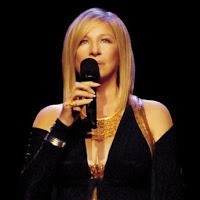 "Whatever you think of Barbra Streisand's talent or personality," I wrote, "when you are in her energy field, you touch that [limitlessness of your soul's natural state] and your soul cries out, 'Me too! That's who I am, too!!'
"Whatever you think of Barbra Streisand's talent or personality," I wrote, "when you are in her energy field, you touch that [limitlessness of your soul's natural state] and your soul cries out, 'Me too! That's who I am, too!!'"Here in the Western world, where we have been taught to play small, we transfer all of our natural desire for the fenceless world of a life lived large to our movie stars and sports heroes.
"If we can't play out our own passion and power, we play it out through a celebrity cult that's no healthier than any other cult, one we also find in countries with charismatic leaders/dictators, in religions with unapproachable gods and in all situations where we abdicate the expression of our infinite nature to someone or something outside of ourselves."
How much of the grief for Jobs, I began to wonder, is not about the death of a brilliant man whose visions touched so many but about the death of a figure who publicly lived so much of the courage, vision, sense of purpose and uncompromising adherence to inner truth that so many of us shrink from in our own lives.
Steve Jobs was not unusual. We all have the same access to the same infinite pool of wisdom, courage, purpose and inner truth that he did...not to mimic his journey and follow his bliss, but to uncover and follow our own...wherever it might carry us.
In my novel, The MoonQuest , very much a metaphor for all our journeys, the main character, Toshar, is destined for a greatness he continues to resist. Yet destiny, as he is constantly reminded, is not cast in stone. There is always a choice.
"Every choice you have ever made," Toshar is told, "has led to this moment...of choice."
"The power to choose is always ours," I wrote in Larger Than Life . "In every moment and through every situation, we're offered the opportunity to choose our greatness, our passion, our light."
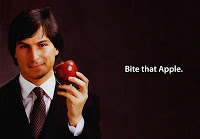 The best tribute to Steve Jobs is to not quote his words but to live them, to not restate his wisdom but to find and write your own, to not honor the choices of his heart but to listen to and honor the choices of yours, to not look backward but to live in the present moment as you step forward into the next.
The best tribute to Steve Jobs is to not quote his words but to live them, to not restate his wisdom but to find and write your own, to not honor the choices of his heart but to listen to and honor the choices of yours, to not look backward but to live in the present moment as you step forward into the next.It's time to awaken your vision. It's time to rekindle your passion. It's time to live your greatness.
If that becomes Steve Jobs's legacy, the revolution in each of our lives -- and in the world -- will only have just begun.
Please "like" these Facebook pages:
• The MoonQuest book
• The MoonQuest movie
• The Voice of the Muse book
• Mark David Gerson fan page
Published on October 08, 2011 10:11
The Best Tribute to Steve Jobs: Live Your Greatness
 "...the works that I do shall he do also; and greater works than these shall he do..."
"...the works that I do shall he do also; and greater works than these shall he do..."~ John 14:12
"Follow your bliss."
~ Joseph Campbell
"Oh, give me land, lots of land under starry skies above / Don't fence me in."
~ Cole Porter
I was packing up to leave Starbucks from an afternoon's writing on Wednesday when I heard about Steve Jobs's death. The news came to me in a terse email notice from the MyAppleSpace social network. The subject line read "Steve Jobs is dead."
Incredulous, I thought it was a hacker's prank. Only when I had double-checked the news against a reliable source could I bring myself to believe it.
Like many, I received and verified the news about Jobs on products he had pioneered. For me it was a MacBook Pro laptop and an iPhone.
And like so many around the world, I was grief struck.
Here was a man who had spent most of his life bucking the system, never letting fear or conventional wisdom get in the way of what he knew to be right and true. Nor did he ever permit the legions of critics and pundits who declared him foolhardy and misguided to stop him from following the path he knew in his heart to be the correct one.
Was he a saint? Hardly. Few geniuses are. Could he be cruel and cutting? Apparently so, for he is reputed to have had little patience for those who doubted or stood in the way of his passionate vision.
Few in the Western world remain untouched by that vision. Even those who swear they will never touch an Apple product have been affected by the revolutions in computing and music distribution that he incited.
Did he change the world? Absolutely. Did he do it uncompromisingly and on his own terms? Undoubtedly.
 Is his greatest legacy the products and software systems he engineered? Not hardly.
Is his greatest legacy the products and software systems he engineered? Not hardly.Through the day or so following Steve Jobs's death, I was deeply moved, sometimes to tears, but the outpouring of love, respect and grief for this man. But by Friday night, as I scrolled through the unending stream of Jobs tributes and Jobs quotes in my Facebook news feed, something about it all began to trouble me.
Don't get me wrong. The sentiments expressed were true and powerful, and I clicked the "like" button on many of them.
But I began to wonder, as I read them all, how often we latch onto the words and lives of others as a way to avoid expressing our own words and living our own lives.
Back in 2006 while visiting Toronto, I was privileged to attend a Barbra Streisand concert. It was a performance that more than filled the city's vast Air Canada Centre. I wrote about that experience here two years ago, in a post titled Larger Than Life .
 "Whatever you think of Barbra Streisand's talent or personality," I wrote, "when you are in her energy field, you touch that [limitlessness of your soul's natural state] and your soul cries out, 'Me too! That's who I am, too!!'
"Whatever you think of Barbra Streisand's talent or personality," I wrote, "when you are in her energy field, you touch that [limitlessness of your soul's natural state] and your soul cries out, 'Me too! That's who I am, too!!'"Here in the Western world, where we have been taught to play small, we transfer all of our natural desire for the fenceless world of a life lived large to our movie stars and sports heroes.
"If we can't play out our own passion and power, we play it out through a celebrity cult that's no healthier than any other cult, one we also find in countries with charismatic leaders/dictators, in religions with unapproachable gods and in all situations where we abdicate the expression of our infinite nature to someone or something outside of ourselves."
How much of the grief for Jobs, I began to wonder, is not about the death of a brilliant man whose visions touched so many but about the death of a figure who publicly lived so much of the courage, vision, sense of purpose and uncompromising adherence to inner truth that so many of us shrink from in our own lives.
Steve Jobs was not unusual. We all have the same access to the same infinite pool of wisdom, courage, purpose and inner truth that he did...not to mimic his journey and follow his bliss, but to uncover and follow our own...wherever it might carry us.
In my novel, The MoonQuest , very much a metaphor for all our journeys, the main character, Toshar, is destined for a greatness he continues to resist. Yet destiny, as he is constantly reminded, is not cast in stone. There is always a choice.
"Every choice you have ever made," Toshar is told, "has led to this moment...of choice."
"The power to choose is always ours," I wrote in Larger Than Life . "In every moment and through every situation, we're offered the opportunity to choose our greatness, our passion, our light."
 The best tribute to Steve Jobs is to not quote his words but to live them, to not restate his wisdom but to find and write your own, to not honor the choices of his heart but to listen to and honor the choices of yours, to not look backward but to live in the present moment as you step forward into the next.
The best tribute to Steve Jobs is to not quote his words but to live them, to not restate his wisdom but to find and write your own, to not honor the choices of his heart but to listen to and honor the choices of yours, to not look backward but to live in the present moment as you step forward into the next.It's time to awaken your vision. It's time to rekindle your passion. It's time to live your greatness.
If that becomes Steve Jobs's legacy, the revolution in each of our lives -- and in the world -- will only have just begun.
Please "like" these Facebook pages:
• The MoonQuest book
• The MoonQuest movie
• The Voice of the Muse book
• Mark David Gerson fan page
Published on October 08, 2011 10:11
October 7, 2011
Write, Write, Write...Now!
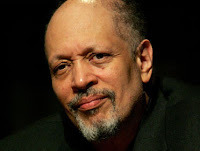 www.waltermosley.comThe only thing that matters is that you write, write. write. It doesn't have to be good writing. As a matter of fact, almost all first drafts are pretty bad.
www.waltermosley.comThe only thing that matters is that you write, write. write. It doesn't have to be good writing. As a matter of fact, almost all first drafts are pretty bad.~ Walter Mosley


Just write. Just get words onto the page.
It doesn't matter what you write or how you begin. All that matters is that you do begin. All that matters is that you write one word and then another. And then another.
However you begin, your first words will take you where you need to go, as long as you answer the call of your Muse, as long as you listen to your story, as long as you free your words onto the page and go wherever they carry you.
There's a time to revise, rework and reword. That time is later. Now is the time to write, to begin.
Have you begun? Are you writing your story, your poem, your screenplay, your theatre script, your book?
 If not, close your browser and open your writing program. Or get pen and paper. Or quill and parchment, if that's your preference.
If not, close your browser and open your writing program. Or get pen and paper. Or quill and parchment, if that's your preference.However you prefer to write, write. Just one word. Any word. Then another. And another.
It's time to begin. Now. All it takes is one word: the one word that gets you started.
• Adapted from The Voice of the Muse: Answering the Call to Write (c) 2008 Mark David Gerson
Please "like" these Facebook pages:
• The Voice of the Muse book • The MoonQuest movie • The MoonQuest book • Mark David Gerson
Published on October 07, 2011 09:44
September 26, 2011
The Q'ntana Trilogy Movies: Teaser + Website
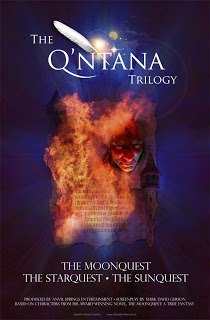 Some of you may recall all the pieces I posted here earlier in the year about the film trailer we were shooting in March to help attract investors to a MoonQuest movie.
Some of you may recall all the pieces I posted here earlier in the year about the film trailer we were shooting in March to help attract investors to a MoonQuest movie.After many months of post-production, we have edited the footage down to a one-minute teaser, set it to music composed by the fabulously talented Mattias Holmgren and posted it to a brand-new website. The site also includes synopses of all three of my Q'ntana Trilogy stories (The MoonQuest, The StarQuest and The SunQuest), a "making-of" featurette and additional info on the project.
Although teaser and site are primarily designed to entice investors, distributors and sales agents to become financially involved with the Trilogy project, they're still public. So please have a look!
If you were involved with the trailer project or supported us through our Indie GoGo campaign, be sure to look for your name on the site's credits page. (If you notice any errors or omissions, please let me know so I can make the necessary corrections.) And if you have any comments about teaser, site or project, please feel free to post them here.
Finally, if you haven't already, please "like" The Q'ntana Trilogy Movie's Facebook page and The MoonQuest book's Facebook page.

Published on September 26, 2011 20:11
September 21, 2011
Whose Story Is It?
"Without characters there's no story."
~ Karl Iglesias, Writing for Emotional Impact
"When I hit a real block, I find it's usually because I've...said something false or made a character do what he doesn't want to do."
~ Anne Tyler
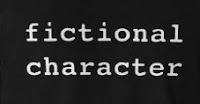 About two years ago, I was listening to a guest speaker -- let's call him Tom -- at a writer's group. He was talking about characters.
About two years ago, I was listening to a guest speaker -- let's call him Tom -- at a writer's group. He was talking about characters.
"In the first half of your story," he said, "let your characters do what they want. But when you get to the second half, you've got to reign them in."
Tom was pretty insistent, and it was all I could do to not jump up and shriek NO!...not to the first half of his statement, but to the second.
I was reminded of that story some months later when I began working with a new coaching client. She'd written a powerful memoir -- so powerful that it had been nominated for a literary award. Now, a fictional character had accosted her in a misty Irish glen and was insisting that she write his story.
-- so powerful that it had been nominated for a literary award. Now, a fictional character had accosted her in a misty Irish glen and was insisting that she write his story.
"But I've never written a novel," she exclaimed. "I don't know how!"
"You don't have to know how," I replied. "All you have to do is write his memoir."
Thing is, whatever story we're telling -- whether it's a novel, short story, stage play or screenplay -- we're writing someone's story.
What we're writing is their story. And what we're often discovering in that first draft is not only what that story is but who that character is...who all the characters are who make up that world.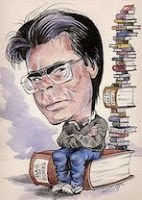
Tom's point was that we spend the first half of our story discovering who the character is. From there, we spend the rest of the story making sure the character hews to that portrait.
My point is that we may only truly discover who that character is and what she's about by writing through to the end. Why stifle the creative process just when we've finally surrendered to the story's unfoldment? Why limit ourselves and our characters by insisting that at a certain point in the draft, character and story are fixed for all time?
When I was working on the first draft of The StarQuest (the first of two projected sequels to The MoonQuest), I had a pretty good idea who the villain of the story was and to what unpleasant end she would come in the final scenes. At least, I thought I did...
Then, on my last day of work on that draft, as I was letting one of the final scenes write itself, something unanticipated happened: Instead of the ugly death I was expecting, the villain had a profoundly redemptive experience that, within a few paragraphs, had transformed her from ugly antagonist into a positive force for continuing good. I was stunned.
In that moment, I had two choices: I could follow Tom's advice and refuse the villain her redemption, or I could surrender to the character's higher imperative and permit the alchemy to occur. I chose the latter, not only because I believe my stories and their characters are smarter than I am, but because my villain's transformation supports one of the story's central themes in ways I would have been hard-pressed to consciously manufacture.
 In The MoonQuest, much about the character O'ric shifted -- not only through the first draft, but through many of the drafts. He shifted not because I couldn't reign him in. He shifted because, through the writing, I began to understand more clearly who he truly was, both within himself and to the story.
In The MoonQuest, much about the character O'ric shifted -- not only through the first draft, but through many of the drafts. He shifted not because I couldn't reign him in. He shifted because, through the writing, I began to understand more clearly who he truly was, both within himself and to the story.
In the "rules for character-building" that I use when I teach workshops on characterization, Rule #10 reads "How did John become Jane? And why is she suddenly the villain?"
Often, characters in our stories want to undergo radical changes through the course of that first draft. Too often, we follow Tom's advice and refuse them that freedom.
My view is that our job as Writer God is to give our characters absolute freedom through the entire first draft of our story...and, sometimes, beyond.
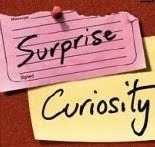 Unlike Tom, I say, Let your characters be as inconsistent and mercurial as they want to be. Let them veer off in completely different directions partway, if that's what they choose. Let your villains become heroes and your heroes become villains. Let them change names, physical characteristics, motivations and story-significance. Let them change gender.
Unlike Tom, I say, Let your characters be as inconsistent and mercurial as they want to be. Let them veer off in completely different directions partway, if that's what they choose. Let your villains become heroes and your heroes become villains. Let them change names, physical characteristics, motivations and story-significance. Let them change gender.
Only by allowing them that freedom in your first draft will you learn who they truly are and be true to their story. After all, it's their story you're telling.
Let your first draft, as I said earlier, be your journey of discovery: of your characters and of their story. Through that journey, you will grow into your story and its characters. You might, as I did in The StarQuest, only discover something of major significance about an important character on the final page of the draft. That's okay. Use your next draft to bring consistency to the characters you now know more fully.
Remember whose story you're telling...and get out of the way!
• How can you better trust your characters to reveal themselves to you?
• How can you stop trying to control your stories and, instead, let them emerge organically?
• How can you better surrender to the magic out of which all creativity is birthed?
• How can you trust that your stories and characters know themselves better than you do?
• How can you let yourself be surprised -- by your characters and by their stories?
You'll get help answering these and other questions about your writing process and projects in The Voice of the Muse: Answering the Call to Write.
Art credits: 1) Detail from the Zazzle "fictional character" t-shirt; 2) Image from the Talk Stephen King blog; 3) Detail from the cover of Karl Iglesias's book, Writing for Emotional Impact

~ Karl Iglesias, Writing for Emotional Impact

"When I hit a real block, I find it's usually because I've...said something false or made a character do what he doesn't want to do."
~ Anne Tyler

 About two years ago, I was listening to a guest speaker -- let's call him Tom -- at a writer's group. He was talking about characters.
About two years ago, I was listening to a guest speaker -- let's call him Tom -- at a writer's group. He was talking about characters."In the first half of your story," he said, "let your characters do what they want. But when you get to the second half, you've got to reign them in."
Tom was pretty insistent, and it was all I could do to not jump up and shriek NO!...not to the first half of his statement, but to the second.
I was reminded of that story some months later when I began working with a new coaching client. She'd written a powerful memoir
 -- so powerful that it had been nominated for a literary award. Now, a fictional character had accosted her in a misty Irish glen and was insisting that she write his story.
-- so powerful that it had been nominated for a literary award. Now, a fictional character had accosted her in a misty Irish glen and was insisting that she write his story."But I've never written a novel," she exclaimed. "I don't know how!"
"You don't have to know how," I replied. "All you have to do is write his memoir."
Thing is, whatever story we're telling -- whether it's a novel, short story, stage play or screenplay -- we're writing someone's story.
What we're writing is their story. And what we're often discovering in that first draft is not only what that story is but who that character is...who all the characters are who make up that world.

"I have never demanded of a set of characters that they do things my way. On the contrary, I want them to do things their way. In some instances, the outcome is what I visualized. In most, however, it's something I never expected."
~ Stephen King
Tom's point was that we spend the first half of our story discovering who the character is. From there, we spend the rest of the story making sure the character hews to that portrait.
My point is that we may only truly discover who that character is and what she's about by writing through to the end. Why stifle the creative process just when we've finally surrendered to the story's unfoldment? Why limit ourselves and our characters by insisting that at a certain point in the draft, character and story are fixed for all time?
When I was working on the first draft of The StarQuest (the first of two projected sequels to The MoonQuest), I had a pretty good idea who the villain of the story was and to what unpleasant end she would come in the final scenes. At least, I thought I did...
Then, on my last day of work on that draft, as I was letting one of the final scenes write itself, something unanticipated happened: Instead of the ugly death I was expecting, the villain had a profoundly redemptive experience that, within a few paragraphs, had transformed her from ugly antagonist into a positive force for continuing good. I was stunned.
In that moment, I had two choices: I could follow Tom's advice and refuse the villain her redemption, or I could surrender to the character's higher imperative and permit the alchemy to occur. I chose the latter, not only because I believe my stories and their characters are smarter than I am, but because my villain's transformation supports one of the story's central themes in ways I would have been hard-pressed to consciously manufacture.
 In The MoonQuest, much about the character O'ric shifted -- not only through the first draft, but through many of the drafts. He shifted not because I couldn't reign him in. He shifted because, through the writing, I began to understand more clearly who he truly was, both within himself and to the story.
In The MoonQuest, much about the character O'ric shifted -- not only through the first draft, but through many of the drafts. He shifted not because I couldn't reign him in. He shifted because, through the writing, I began to understand more clearly who he truly was, both within himself and to the story.In the "rules for character-building" that I use when I teach workshops on characterization, Rule #10 reads "How did John become Jane? And why is she suddenly the villain?"
Often, characters in our stories want to undergo radical changes through the course of that first draft. Too often, we follow Tom's advice and refuse them that freedom.
My view is that our job as Writer God is to give our characters absolute freedom through the entire first draft of our story...and, sometimes, beyond.
 Unlike Tom, I say, Let your characters be as inconsistent and mercurial as they want to be. Let them veer off in completely different directions partway, if that's what they choose. Let your villains become heroes and your heroes become villains. Let them change names, physical characteristics, motivations and story-significance. Let them change gender.
Unlike Tom, I say, Let your characters be as inconsistent and mercurial as they want to be. Let them veer off in completely different directions partway, if that's what they choose. Let your villains become heroes and your heroes become villains. Let them change names, physical characteristics, motivations and story-significance. Let them change gender.Only by allowing them that freedom in your first draft will you learn who they truly are and be true to their story. After all, it's their story you're telling.
I do my best work when I feel least like its source and most like its channel.
~Lawrence Block
Let your first draft, as I said earlier, be your journey of discovery: of your characters and of their story. Through that journey, you will grow into your story and its characters. You might, as I did in The StarQuest, only discover something of major significance about an important character on the final page of the draft. That's okay. Use your next draft to bring consistency to the characters you now know more fully.
Remember whose story you're telling...and get out of the way!
"It begins with a character, usually, and once he stands up on his feet and begins to move, all I can do is trot along behind him with a paper and pencil trying to keep up long enough to put down what he says and does."
~ William Faulkner
• How can you better trust your characters to reveal themselves to you?
• How can you stop trying to control your stories and, instead, let them emerge organically?
• How can you better surrender to the magic out of which all creativity is birthed?
• How can you trust that your stories and characters know themselves better than you do?
• How can you let yourself be surprised -- by your characters and by their stories?
You'll get help answering these and other questions about your writing process and projects in The Voice of the Muse: Answering the Call to Write.
Art credits: 1) Detail from the Zazzle "fictional character" t-shirt; 2) Image from the Talk Stephen King blog; 3) Detail from the cover of Karl Iglesias's book, Writing for Emotional Impact

Published on September 21, 2011 20:18
September 18, 2011
Anatomy of a Writer: A Blog Interview
 This blog interview with me originally appeared in The Uncustomary Book Review on September 13.
This blog interview with me originally appeared in The Uncustomary Book Review on September 13.
Anatomy of the Writer
UBR: What are writers for?
MDG: Writers are for expressing the truths of the human heart into words on the page. Writers are for finding the universal in the human experience. Writers are for painting worlds of wonder beyond the conscious imagination.
UBR: Quill and parchment or touch typing?
 MDG: The bards and elderbards in my
Q'ntana Trilogy
of fantasy books and movies definitely write with quills on parchment. And although I wrote its first installment,
The MoonQuest
, longhand, I've written all my other books and screenplays largely on the computer.
MDG: The bards and elderbards in my
Q'ntana Trilogy
of fantasy books and movies definitely write with quills on parchment. And although I wrote its first installment,
The MoonQuest
, longhand, I've written all my other books and screenplays largely on the computer.UBR: Required beverage while editing?
MDG: Coffee (americano or cappuccino)!
UBR: Describe your imagination.
MDG: It defies description, at least by me. It's that realm of "true fantasy" that lies beyond any conscious knowingness and to which I must always surrender…because it's smarter than I am.
Anatomy of the Reader
UBR: Where's your favorite place to read?
MDG: The bathtub!
 UBR: Have you ever read one of your books for pleasure?
UBR: Have you ever read one of your books for pleasure?MDG: No. It would be interesting to see if I could separate myself enough from my author self to try it.
UBR: What's the one thing that the book you're currently reading is missing?
MDG: A feeling of engagement. Which is why I put it down after about forty pages and am about to start something else.
Uncustomary Traditions
 Favorite places: Places of peaceful beauty (oceans, mountains, desert) and places of high-octane urban buzz (L.A., Toronto, New York)
Favorite places: Places of peaceful beauty (oceans, mountains, desert) and places of high-octane urban buzz (L.A., Toronto, New York)Weaknesses: Dark chocolate, Starbucks
Believes in: The innate creativity of every human
Refuses to: Compromise my essential self for anyone else
Uncustomary Review of Author's Work
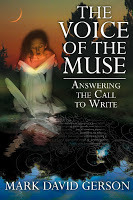 The Voice of the Muse: Answering the Call to Write
The Voice of the Muse: Answering the Call to Write
• Reprinted from The Uncustomary Book Review: A Conversation with the Reader, 9/13/2011
Published on September 18, 2011 10:55
September 13, 2011
It's Time To Live the Dream
 "You just have to keep your dream. If you lose it and get cynical, you die."
"You just have to keep your dream. If you lose it and get cynical, you die."~ Meryl Streep
"Where there is no vision, the people perish."
~ Proverbs 29:18
What's your dream for your writing? For your life?
Know that whatever it is, however improbable it may seem in this moment, it's not impossible. Nearly every success story begins with an "impossible" dream. Nearly every "overnight success" was years in the making.
Have you begun the book or screenplay you've always dreamt of writing? Now is the time to put your dream into action. It doesn't matter whether you can give it five minutes a day or five hours. It doesn't even matter if you know what it's about.
Every journey begins with a single step. Every piece of writing begins with a single word. Any word.
Write it. Now.
What about your dreams for your life? Have you abandoned them? Stuffed them in the back of a drawer because they seem so unreachable?
Open that drawer. Reach your hand in. Gently. Touch it. Reconnect with it. Reconnect with yourself.
Open your heart again. Open your heart to the vision. Open your heart to your life.
Meryl Streep photo from Pictures of Famous Actors and Actresses. Meryl Streep quote from Inside Inside
 by James Lipton.
by James Lipton.
Published on September 13, 2011 03:44
September 12, 2011
The MoonQuest: Introducing a New Video Trailer for the Book
Imagine...
a land where stories are banned and dreams suppressed...a land where dreamers are tortured and storytellers killed...
a land stripped of vision, hope and imagination.
This is the Q'ntana of The MoonQuest...
a land where "once upon at time" is a forbidden phrase
...where fear rules and storytelling spells death
Imagine it...if you dare The MoonQuest: A True Fantasy Part 1 of The Q'ntana Trilogy of fantasy novels
Soon to be a major motion picture! Get your copy today!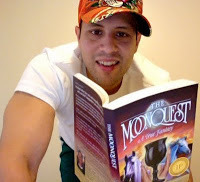
"An exceptional, timeless novel."~ Mindquest Review of Books
Please "like" The MoonQuest's book and movie pages on Facebook!
• MoonQuest book trailer produced by John M. Burkhart• Toshar portrayed by Eric Esparza• Reader pic: Gabriel Sinatra
If the video link is not live, view it on YouTube

a land stripped of vision, hope and imagination.
This is the Q'ntana of The MoonQuest...
a land where "once upon at time" is a forbidden phrase
...where fear rules and storytelling spells death
Imagine it...if you dare The MoonQuest: A True Fantasy Part 1 of The Q'ntana Trilogy of fantasy novels
Soon to be a major motion picture! Get your copy today!

"An exceptional, timeless novel."~ Mindquest Review of Books
Please "like" The MoonQuest's book and movie pages on Facebook!
• MoonQuest book trailer produced by John M. Burkhart• Toshar portrayed by Eric Esparza• Reader pic: Gabriel Sinatra
If the video link is not live, view it on YouTube
Published on September 12, 2011 10:09
September 11, 2011
The Art of Healthy Feedback: Part II - How To Give It
 Part II of a two-part series on asking for and giving healthy feedback.
While both pieces are focused
on writing and other creative pursuits, they can easily be adapted to the many situations in our lives when we are giving or seeking help or advice.
Part II of a two-part series on asking for and giving healthy feedback.
While both pieces are focused
on writing and other creative pursuits, they can easily be adapted to the many situations in our lives when we are giving or seeking help or advice.
1. Be Nurturing.
Remember, the only reason to offer feedback is to support the writer and his or her work. This is not a test of your ability to pick out flaws. Don't be smart. Be gentle. Don't show off. Be fair.
2. Be Balanced.
Always begin with the positive -- with what you like about the piece, with its strengths, with what works for you. With that foundation of support, you can then offer constructive comments. Remember, you can say anything you feel called to say about the work, as long as you frame it with respect and compassion.
3. Be Specific.
You're at your most helpful when you can offer examples from the text of what works and what doesn't. Be clear.
4. Be Respectful.
Give only the type and level of feedback the writer has sought. If there are other elements you would like to comment on, ask permission. Respect the answer you get.
5. Be Compassionate.
Remember the Golden Rule of Feedback: "Speak unto others in the manner you would have them speak unto you." Put yourself in the writer's shoes and offer feedback as you would prefer to receive it.
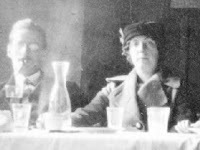
How not to give feedback....
"Why don't you write books people can read?"
~ Nora Joyce, to her husband James
• How can you listen more clearly to the nature of the feedback being requested of you?
• How can you be clearer in the feedback you offer?
• How can you be more respectful of the work and its author, offering feedback that doesn't show how smart you are but, instead serves the needs and growth of the writer and his/her work?
The Art of Healthy Feedback: A Two-Part Series I - How To Get It
 II - How To Give It
II - How To Give ItAdapted from The Voice of the Muse: Answering the Call to Write, (c) 2008 Mark David Gerson
Please "like" these Facebook pages:• The Voice of the Muse book • The MoonQuest movie • The MoonQuest book • Mark David Gerson
Photo: James & Nora Joyce, 1915 -- Beinecke Rare Book and Manuscript Library, Yale University
Published on September 11, 2011 03:44



